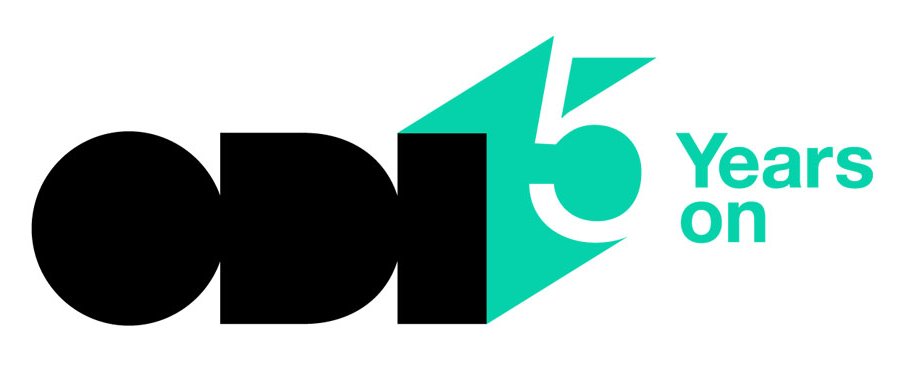
To mark the launch of ODI: ‘5 Years on’, CEO Jeni Tennison reflects on her favourite successes, five lessons we’ve learned and memories of #LifeAtTheODI so far.

Tim Berners-Lee and Nigel Shadbolt founded the ODI five years ago to catalyse an open data economy – bringing together individuals, businesses and governments from all over the world. I’m really proud to be celebrating five years of the ODI: five years in which we’ve made a huge amount of impact.
We have much to reflect on and celebrate over the coming months. We’ll be taking stock: looking at what we’ve achieved and what we could have done better. We want people to feel more inspired by data’s potential than ever and to keep working towards our mission: to build a strong, fair and sustainable data economy by helping businesses and governments get data to people who need it.
Five years ago, data seemed to belong in the realm of the techies and geeks. Since then, a data revolution has given rise to an exponentially growing volume of data, changing the way we live our lives and access services. Remember planning a journey without data-powered travel apps like Citymapper? The race is on for businesses to harness the value from openness while protecting personal data. Five years ago, the open data movement was in uncharted waters, now it has global momentum.
The ODI encourages and enables countries, governments and whole sectors to strengthen data infrastructure, transition to an open culture, build a sustainable data strategy, develop data skills and find new ways to innovate. We’ve done this by bringing people together, by being a critical friend, and by championing open approaches to innovation and working cultures.
In the last five years, working with our global network of ODI Nodes, ODI Members and ODI Startups, the ODI has:
- reached a global audience of over 3 million
- trained thousands in new data skills in over 20 countries, from Tanzania to Mexico, Malaysia to Ukraine
- supported hundreds of startups globally with data through challenges, mentoring, incubation and acceleration programmes
- unlocked over £70 million investment
Five lessons
We have learnt many important lessons about what enables data initiatives to thrive and achieve impact over the last five years. We know that data policies and strategies need to be planned for and applied in the right way. If we can adopt these lessons now and in future, we can ensure that data ‘works’ sustainably, in the ways we intend it to. There are five lessons that stand out:
- Embracing openness with data is more about culture than it is technology.Open approaches to leadership, working practices and innovation are key.
- We can't get the benefits of open data without having a proper open licence.You can make data publicly available for free, but if you use a licence that restricts the way the data can be used, or by whom, it won’t reach its potential.
- Data literacy is about much more than learning how to clean or analyse data. We need to develop everyone’s skills so they know how to control their own data, and understand how it might be used. Policymakers and business leaders also need to be thinking about using data as a tool to achieve their goals.
- Individuals drive change, and the people driving change in companies or governments are often isolated. Bringing them together provides support and enables learning.
- Data is not like oil. We choose what we collect, how we maintain it, and who gets to use it. It is more like roads: a networked infrastructure we all rely on.
Data highlights
These lessons in data have helped us work with governments and businesses to achieve some remarkable outcomes:
2013
We launched the Open Data Challenge Series in partnership with Nesta: a series of seven challenge prizes inviting businesses, startups and individuals to develop innovative solutions to social issues using open data. PwC predicted a return of £5–10 to the UK economy, for every £1 invested in the ODCS – this equates to a generation of £5.3m to £10.8m (GVA).
2014
The ODI launched the Open Data Incubator for Europe alongside six other consortium partners from across Europe. With a €7.8m grant from the European Commission, the three-year programme has supported 57 businesses innovating with open data, in 18 countries, creating 268 jobs and generating an impact of €22.5m.
2015
We worked with the Burkina Faso civil service to release general election results in real-time as open data, supporting the first free elections in the country in 30 years.
2016
We worked in partnership the Tanzania Data Lab (dLab), based at the University of Dar es Salaam, to raise data literacy skills and enable local people to deliver and scale the training. The ODI built a network of in-country qualified trainers who have already trained over 300 public, private and third sector delegates in just over 6 months, 50% of whom were women.
2017 and beyond
With Sport England we are working on OpenActive, a nationwide initiative to help sport and physical activity providers publish data on where and when activities are happening, helping people find opportunities to become more active. So far the initiative has an active community of 71 supporting members, and 14 activity providers have published their data.
I feel honoured to be the CEO of an organisation which has such a vibrant, dedicated and wonderful team. I also feel very fortunate to be part of the open and data movements, which continue to inspire me with their energy and vision.
Over the next few months we will be celebrating ODI: 5 years on with events, new data stories, opinion pieces, industry insights, videos and Twitter conversations. Follow and join our activities with the hashtag: #ODI5YO